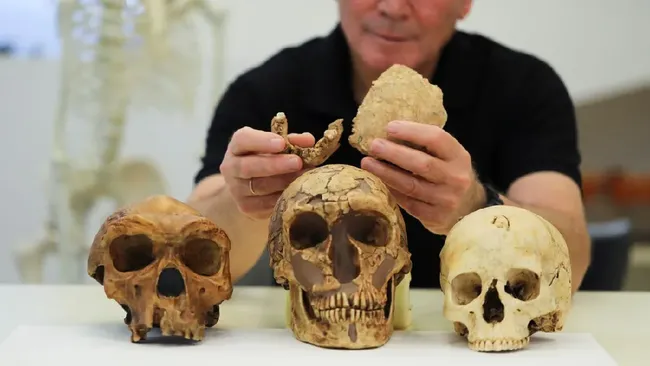Jakarta, CNN Indonesia —
Researchers found a new type of ancient human in Israel called Homo Nesher Ramla, the name given to the location of the discovery.
The reason is, the findings of ancient human bones came from excavations in a cement factory quarry near the center of the city of Ramla. This ancient human is called not the same as other Homo genera. This finding is called by researchers from Tel Aviv University and the Hebrew University of Jerusalem to be a new link related to human evolution (25/6).
In a research report published in the journal Science, the fossils are said to be between 140,000 and 120,000 years old. The researchers believe that the Nesher Ramla type would intersect with Homo sapiens, the modern human lineage.
“We never imagined that with Homo sapiens, early Homo roamed the area at the end of human history,” said lead archaeologist Yossi Zaidner.
“The human morphology of Nesher Ramla shares features with Neanderthals… and an ancient Homo type,” the researchers said in a statement.
“At the same time, this type of Homo was very different from modern humans — featuring a completely different skull structure, without a chin and very large teeth.”
Along with human remains, the excavations uncovered large amounts of animal bones as well as stone tools.
“Archaeological findings related to human fossils suggest that ‘Nesher Ramla Homo’ had advanced stone tool production technology and most likely interacted with local Homo Sapiens,” Zaidner said.
The researchers suggest that some of the fossils previously found in Israel that are 400,000 years old may belong to the same prehistoric type of human.
Anthropologist and dentist Rachel Sarig of Tel Aviv University said researchers had previously tried to attribute the older bones to known human groups such as Homo sapiens or Neanderthals.
“But now we say: No. This is a group in itself, with distinct traits and characteristics,” he said.
Neanderthal origin controversy
Israeli researchers make the controversial claim that the discovery of these new ancient Homo early humans in the Middle East challenges the common idea that Neanderthal Homo originated in Europe.
“Prior to this new discovery, most researchers believed that Neanderthals were a ‘European tale’, where a small group of Neanderthals were forced to migrate south to escape the spreading glaciers,” said Hershkovitz of Tel Aviv University, Israel.
“Our findings suggest that the famous Neanderthals in Western Europe were just remnants of a much larger population that lived here in the Levant — and not the other way around.”
Sarig said small groups of Nesher Ramla species likely migrated to Europe, then evolved into Neanderthals, and Asia, developing into populations with similar characteristics.
The researchers say this may also explain how some Homo sapiens genes have been found in Neanderthal populations that may have lived in Europe long before the arrival of Homo sapiens.
Professor Chris Stringer, of the Natural History Museum in London, said the Israeli findings were important but he questioned the researchers’ claims about the early humans’ relationship with Neanderthals.
“I think it’s a leap too far at the moment to link some of the older Israeli fossils to Neanderthals,” Stringer told the BBC.
Geneticists studying European Neanderthal DNA have previously suggested the existence of a Neanderthal-like population, dubbed the ‘lost population’ or ‘population X’, that would have interbred with Homo sapiens more than 200,000 years ago.
In the paper, Israeli researchers suggest that the Nesher Ramla Homo species may be the missing link.
Sarig said the findings show that “as a crossroads between Africa, Europe and Asia, the Land of Israel served as a melting pot in which different human populations mixed with one another, to then spread throughout the Old World.
“The discovery of the Nesher Ramla site writes a new and exciting chapter in the story of mankind,” he said.
(ex)
– .


